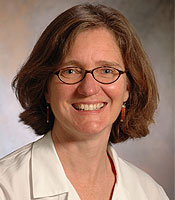By: Mrinal Y. Shah
Lucy A. Godley, MD, PhD, unlike many of us, knew early on what she wanted to do in life. Her first research experience came in high school, when she worked in a hematology lab at Yale University. That experience imprinted an interest in science and medicine at a young age, and she has stayed close to that field ever since. From there, she went on to Harvard and Radcliffe Colleges, where she received a B.A. in Biochemical Sciences. She then entered the Medical Scientist Training Program at the University of California, San Francisco, where she earned her PhD in the laboratory of Harold Varmus, MD. Lucy then received her MD from Northwestern University, and she has remained in Chicago ever since. She did her postdoctoral research and fellowship training in Hematology/Oncology at The University of Chicago, where she is now a Professor in the Section of Hematology/Oncology.
Lucy’s main research interest lies in the field of epigenetics. She has always been intrigued by the idea that the properties of DNA can be changed without changing the base sequence, and this area has proved fertile ground for her to merge basic research and clinical medicine. Lucy never wanted to be a private physician, deeming it “too routine,” and opted instead for the life of an academic researcher, which she finds more flexible and creative. As she says, “I get to ask a question that no one has asked before and then I get to know the answer first!”
In addition to her study of epigenetics, Lucy’s research has expanded in the past few years to include the study of germline predisposition to bone marrow-derived cancers, a project that developed from one of her clinic patients. In the past, the literature has described inherited leukemias as quite rare, but Lucy now has a cohort of more than 200 families that appear to have inherited forms of disease. Some of these families have contributed to the recent description of two new inherited syndromes, and she anticipates that there are many more to be discovered. This is a perfect example of what excites Lucy most about her work: not only interacting with patients to make a difference in their daily lives, but also being able to discover something new and move between the worlds of medicine and science.
Lucy has always been very supportive of and a great mentor to students and scientists who are in all different phases of their studies and careers. She herself has had many mentors along the way, starting back when she was that high school student working in the lab for the first time. These mentors “have stayed with (her) for decades…they are connections that have come back around and are now friends and colleagues.” She refers to her mentors and students as “one big family” that keeps expanding as time goes on.
Speaking of connections, Lucy’s own husband, Alfonso Mondragon, is someone whom she met in the lab next to hers while she was an undergraduate. Alfonso is also a successful scientist and a Professor at Northwestern University. They have two children and a busy family life, on top of their separate careers. Lucy attributes her work/life balance to the mutual respect and communication that she and Alfonso maintain in order for both to be successful.
Lucy fully admits that being a woman in science can present its own set of issues. “I feel the statistics…it’s subtle and it’s there,” she says ruefully, referring to the inequalities that still exist for women in STEM. However, she has never been one to let it get her down. When asked what advice she has for a successful career, she declares, “Find your passion, because when you are exploring your passion, you’re not working. Every day when I come to work, I have fun. Every day, the details of getting everything done work out, and I always enjoy the day.”

